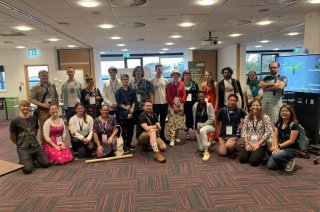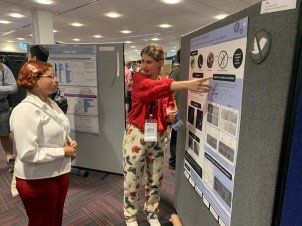My name is Hannah-Isadora and I am ERS7 working on virus infection in tsetse flies. I wrote the first news report in May 2021. Ever since a lot of interesting and innovative articles have been published on this website and I am very glad to share my research with you again. During the last year I had the chance to learn from various researchers in different laboratories. I spent six months at the Wageningen University followed by six months at the Exeter University in Cornwall. In both locations, I was able to improve my cell culture techniques and got encouraged to try new experimental techniques. This brought me to my current project: Separation and isolation of a tsetse Ifla-and negevirus. My PhD objective is to find out what the impact of these viruses is on the health and fitness of the tsetse fly. To understand the viruses’ role, I would like to study their mode of action independently. We used two different approaches: One consists of isolating the virus by passaging via different insect cell cultures and the other by creating infectious clones. We were able to find out that Spodoptera frugiperda Sf9 cells and Aedes albopictus C6/36 cells could only maintain the Glossina morsitans moristans iflavirus infection, but not a Glossina morsitans morsitans Negevirus infection. This will allow us to isolate the iflavirus via ultracentrifugation from the culture fluid. Our goal is now to understand the impact the iflavirus has on the tsetse fly. This will provide us useful information for the mass raring of the tsetse fly which is necessary for the application of the sterile insect technique.
I had the opportunity to present these results at two conferences. At the International Congress of Invertebrate Pathology and Microbial Control (SIP2023) in Maryland, USA and at the Conference of the Royal Entomological Society, in Cornwall UK. In the latter, I shared my findings via a scientific poster. During the second conference we had an entomological fashion day. At this event the participant with the best entomological outfit was selected. It was stunning to see everyone coming up with such nice ideas, from bee inspired earrings to beautiful butterfly skirts. I could convince the jury with insect pans, a fitting bag and the must have for each entomologist: a bucket hat. I received the first price, which was a surprise to me, due to the other very strong participants.
I am now looking forward to my last year of my PhD where I will study the impact of the ifla- and negevirus on the fly’s immune system. I am curious on what I will find and which new challenges will come along with it.



